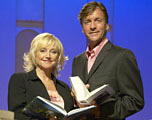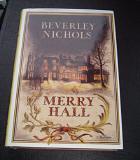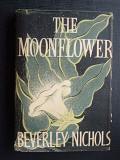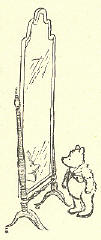Contents:
|
|
|
The death has been announced
of Henry Kenneth
Bulmer, born 1921, a
prolific British author who
died 16th December at
Tunbridge Wells.
He had a stroke in 1997 which
stopped him writing, but until
then he had produced some 160
novels and numerous short
stories and articles under a
variety of pseudonyms. He was
best known for his science
fiction but also wrote other
genre fiction - naval fiction
as Adam Hardy, 'Wolfshead'
Robin Hood-style stories as
Arthur Frazier, as well as
writing novelizations of The
Professionals, and a lengthy
series of space operas under
the pseudonym Alan Burt Akers.
|
|
|
 Dyslexic author
wins Nestlé Children's Book Prize
Dyslexic author
wins Nestlé Children's Book Prize
The Nestlé Children’s Book Prize,
formerly known as the Nestlé Smarties
Book Prize, is now in its 21st year and
is administered by Booktrust, an
independent charity which promotes books
and reading. In 2005 some 55,000
schoolchildren took part in the Prize,
which celebrates the nation’s best
children’s books as voted for by
children themselves. The winners were
presented with their prizes at an award
ceremony at the British Library in
December.
Targetting books for children of primary
school age there are gold, silver and
bronze awards in each of three
categories. The gold award winners were:
of the under 5 years age group, Oliver
Jeffers for 'Lost and Found'; of the 6-8
years age group, Nick Butterworth for
'The Whisperer'; of the 9-11 years age
group the dyslexic author Sally Gardner
for her book 'I, Coriander' published by
Orion, a fantasy tale of murder, magic
and romance set in 17th century London.
Sally Gardner is severely dyslexic and
only learnt to read at the age of
fourteen. She was once told she was
uneducable and was sent to a school for
maladjusted children before discovering
a talent for illustration and
storytelling. She always wanted to
illustrate children’s books but once
admitted: “I honestly never thought it
would be possible to write because of my
dyslexia”. While Sally has published
other children’s books as an illustrator
and storyteller, I, Coriander is her
first book consisting of words alone.
|
|
 Richard &
Judy Book Club
Richard &
Judy Book Club
The Richard and Judy Book Club has been
credited with increasing both reading
and book sales (2 million plus for the
shortlist titles of 2005). Richard
Madeley and Judy Finnigan have released
the titles which will be reveiewed in
their Channel 4 programme for 2006 so if
you want to start reading early, here
they are:
|
The History of Love by Nicole
Krauss
Labyrinth by Kate Mosse
The Farm by Richard Benson
The Conjuror's Bird by Martin
Davis
Arthur & George by Julian
Barnes
|
The Lost Art of Keeping Secrets by
Eva Rice
Moondust by Andrew Smith
March by Geraldine Brooks
Empress Orchid by Anchee Min
The Lincoln Lawyer by Michael
Connelly
|
The short list of 10 was culled from 500
submitted suggestions. After reading,
viewers get to vote for the Best Read
Award which last year was won by Cloud
Atlas by David Mitchell.
|
|
Byron
manuscript discovered
The only known manuscript of a poem by Lord Byron has been found within the archives of University College, London,
by librarian Susan Stead
who stumbled across the original, which had been assumed lost, in an 1810 edition of The Pleasures of Memory by Samuel Rogers.
"I knew Byron and Rogers were acquainted so thought it probably was authentic," she said.
Byron's 12-line poem begins "Absent or present still to thee" and the poem's manuscript, which talks of friendship and memory, was dated 12 April, 1812.
It appeared in print four years later in a volume of collected poems.
She had the work authenticated by various Byron scholars.
Samuel Rogers was a patron of the arts and minor poet and The Pleasures was his most important work.
Byron praised the Pleasures of Memory highly but he later turned against Rogers, writing a bitter lampoon against him in 1818.
|
|
 Beverley
Nichols, 1898-1983, by
Beverley
Nichols, 1898-1983, by
Nigel Smith of
Bagot Books
When I was a child there were two pet
food adverts that I can still remember
vividly. One was a dog food ad which was
presented by Clement Freud (the joke
being that his co-presenter was a
bloodhound and it wasn’t easy to tell
them apart). At the same time there was
a similar format advert for cat food
with a pleasant-faced, slightly chubby
elderly man (although his cat didn’t
look anything like him).
As a child I read the Magic Woodland
Trilogy: The Tree That Sat Down, The
Stream That Stood Still and The Mountain
of Magic, and thoroughly enjoyed them.
On moving to Ashtead twenty-odd years
ago I noticed and admired a fine old
Georgian house opposite a farmyard, in
one of the old lanes that pre-date the
suburban sprawl that has overtaken this
part of Surrey, the pair of them fossils
of the rural landscape that has been
built over since the 1950s.
 Shortly thereafter I discovered that
this house, Merry Hall, had belonged to
an author who had written about his time
in there. I sought out the book, only to
find it was a trilogy by Beverley
Nichols: Merry Hall, Laughter on the
Stairs, and Sunlight on the Lawn. This
is a very readable and funny account of
his acquisition and restoration of the
near derelict garden and, even nearer
derelict, house; assisted by his
major-domo Gaskin, and the redoubtable
Oldfield, a gardener he more or less
found in the potting shed, and who came
as a fixture in the garden. Not only had
he little money to spare, but this was
during post-war austerity; however,
aided by various friends, particularly
‘Marius’ and Gaskin, and several
interfering local ladies, he sets to
work. It is a shame that much of the
land behind and beside Merry Hall is now
occupied by a modern housing estate,
albeit called ‘Oldfield Gardens’.
Shortly thereafter I discovered that
this house, Merry Hall, had belonged to
an author who had written about his time
in there. I sought out the book, only to
find it was a trilogy by Beverley
Nichols: Merry Hall, Laughter on the
Stairs, and Sunlight on the Lawn. This
is a very readable and funny account of
his acquisition and restoration of the
near derelict garden and, even nearer
derelict, house; assisted by his
major-domo Gaskin, and the redoubtable
Oldfield, a gardener he more or less
found in the potting shed, and who came
as a fixture in the garden. Not only had
he little money to spare, but this was
during post-war austerity; however,
aided by various friends, particularly
‘Marius’ and Gaskin, and several
interfering local ladies, he sets to
work. It is a shame that much of the
land behind and beside Merry Hall is now
occupied by a modern housing estate,
albeit called ‘Oldfield Gardens’.
The border between fiction and
biography, especially autobiography, is
often blurred, and in this trilogy it is
very much so. A number of the characters
are either invented or altered, but the
writing is so heartfelt, the narrative
so compelling, that I just had to read
the whole trilogy, and have since
re-read it.
 A year of two after that I read and
thoroughly enjoyed a detection novel
called The Moonflower with an unlikely
hero called Horatio Green. This was also
by Beverley Nichols, was very well
plotted, well written, and humorous;
there were others in this series, so I
started looking out for them, and other
books by Nichols. This was when I
realised that he had written the
Mountain of Magic books.
A year of two after that I read and
thoroughly enjoyed a detection novel
called The Moonflower with an unlikely
hero called Horatio Green. This was also
by Beverley Nichols, was very well
plotted, well written, and humorous;
there were others in this series, so I
started looking out for them, and other
books by Nichols. This was when I
realised that he had written the
Mountain of Magic books.
Since then I’ve read several more of his
gardening books, discovered that he was
part of the Somerset Maugham/Noel Coward
set, and that in recent years he has
become a gay icon.
 And then a little while ago I started
reading one of his last books Down The
Kitchen Sink. It wasn’t quite like the
others I had read. There was no whimsy,
no invention. It was by an old man who’d
seen better days financially and was
describing having to scrimp and make do.
Part way through the book he recalls the
death of Gaskin and he bemoans having to
take a job in a cat food advert to try
to make ends meet. By this time I had
seen a photo of Nichols when he was a
younger man and the penny dropped that
this was the man I remembered in the cat
food ads from my childhood! I do hope
that he was a happier man in his last
days than this book suggests - the only
one of Nichols’ books that I have
started and not finished. But perhaps
it’s a book of its time - Bloody Sunday,
Ted Heath, and the miners’ strikes. Not
much in the news to cheer one in one’s
old age.
And then a little while ago I started
reading one of his last books Down The
Kitchen Sink. It wasn’t quite like the
others I had read. There was no whimsy,
no invention. It was by an old man who’d
seen better days financially and was
describing having to scrimp and make do.
Part way through the book he recalls the
death of Gaskin and he bemoans having to
take a job in a cat food advert to try
to make ends meet. By this time I had
seen a photo of Nichols when he was a
younger man and the penny dropped that
this was the man I remembered in the cat
food ads from my childhood! I do hope
that he was a happier man in his last
days than this book suggests - the only
one of Nichols’ books that I have
started and not finished. But perhaps
it’s a book of its time - Bloody Sunday,
Ted Heath, and the miners’ strikes. Not
much in the news to cheer one in one’s
old age.
I have one more of his Horatio Green
books to obtain and read; there’s a
fourth children’s book (The Wickedest
Witch in the World) that I’m not sure
whether to read or not, and several cat
books I don’t think I will; and I still
have a few of his gardening titles to
read. I own several miscellaneous books
of his. I’ve not started reading any of
his purely autobiographical books yet
(partly because I’m not sure how he
managed to fill so many with enough that
would be interesting), nor any of his
books on politics, religion, flower
arranging, or any of the other various
subjects he wrote about. In addition to
all of these he also wrote four plays, a
book of poetry and, in the 1930s, music
and lyrics.
Beverley Nichols is a collectable author
as the majority of his books are easily
obtainable and moderately priced. Some
of Beverley Nichols gardening books are
in print from Timber Press.
|
|
Ackamaracka¹
or Get your Alans² in a Twist
In 1937, when Eric Partridge, the grand
old man of colloquial English, published
his ‘Dictionary of Slang and
Unconventional English’, it was said
to fill not a gap but a chasm.
Dictionaries of slang and cant have a
long history, but Partridge’s mammoth
work is perhaps the best known of the
twentieth century. George Steiner called
Partridge one of the foremost social
historians of the age, while Anthony
Burgess likened his output and
industriousness to that of Johnson’s.
The very nature of slang, of course is
that it changes and the Partridge’s
original dictionary had been through
many updated editions. This month,
Routledge have brought out a completely
new fifth edition of the work: The
New Partridge Dictionary of Slang and
Unconventional English, in 2 volumes
edited by Tom Dalzell and Terry Victor -
good customers of the author of this
article, I may add (Marijana
Dworski) - 2,216pp and retailing at
£99.00. As Lynsey Hanley of the New
Statesman says: ”The English language
enjoys being ravished once in a while. I
say ravished, rather than ravaged:
purists may moan, but there's nothing
like a good, preferably rude, neologism
to reassure you that English speakers
enjoy the bendiest and most hair-curling
vernacular in the world.”
Click here for her full review
To translate the title see the notes
below - and for a review written totally
in slang (with even more notes) see Ian
Sansom’s review of the dictionary in the
Guardian
¹ - fanciful language intended to
deceive
² - knickers (presumably rhyming slang
derived from Alan Whicker - ed.)
|
|
The Hugo
Awards - Science fiction or Fantasy
Gregory Benford, the science fiction
author, announced recently on his
website that he won’t be writing any
more sf novels in the near future, but
would be concentrating instead on
non-fiction writing.
His reason for this was that, of the
last five Hugo Awards, the Oscars of the
SF community, four were won by fantasy
novels. “The American culture that once
read Heinlein and went to the moon now
puts George Martin (a very good writer,
who started in SF) on the bestseller
lists, and goes nowhere,” he wrote.
The Hugo Awards are voted on by the SF
reading community, so it seems that even
the hardcore fans who go to Conventions
are starting to prefer pseudo-medieval
kingdoms filled with dragons, orcs and
elves to the technologically-based
scientific stories that writers like
Gregory Benford produce.
Click here for full details of the Hugo
Awards (Science Fiction Achievement
Awards) by year and category
|
|
Author
appearance - Poet John
Hegley in London
The poet John Hegley, 'comedy's poet
laureate' (The Independent), will be at
the Battersea Arts Centre, performing
poems from his book 'My Dog Is A
Carrot', from December until 6th January
2006. There will apparently be an act of
mass audience vegetable and dog drawing
– you have been warned!
Further details from: Battersea Arts
Centre, Lavender Hill, London, SW11
5TN
020 7223 2223
www.bac.org.uk
|
|
Brontë Literary
Lunch
The Roe Head Society will hold a
Literary Lunch on Saturday 28 January
2006 at The Barn, Oakwell Hall Country
Park, Birstall, Batley, West Yorkshire.
The Bronte themed day includes Lunch, a
talk by Juliet Barker (author ‘The
Brontes: A Life in Letters’, and former
curator and Librarian of Bronte
Parsonage Museum), a guided tour of the
Hall, and afternoon tea. The Hall is
known to have been visted by Charlotte
and was used as Fieldhead in her novel
‘Shirley’.
Prices are:
Members of the Roe Head Society - £10.00
per person
Others - £15.00 per person
Bookings: Angie Dickinson (Hollybank
Trust) on 01924 489069
|
|
 After Rupert,
Pooh...is nothing sacred?
After Rupert,
Pooh...is nothing sacred?
In November we reported that Rupert,
sold by Express Newspapers to the media
group ER (Entertainment Rights) was in
line for a makeover before re-launch in
an animated TV series with a new set of
friends.
Now it appears that Disney are planning
to 're-brand' Pooh for a new animated
series due in 2007, with rounder,
computer generated characters and
dropping Christopher Robin in place of a
tomboyish red-haired six-year-old girl.
A spokesman for the Disney channel told
USAToday.com that "...the feeling
was these timeless characters really
needed a breath of fresh air that only
the introduction of someone new could
provide".
When will they learn that they alienate
as many, if not more, than they please
by introducing change for the sake of
it. Some of us have still not forgiven
them for the re-drawn Disney characters
that have tended to replace the classic
Shepard ones.
|
|
Orange
Prize 2006
Orange has renewed it's sponsorship for
the Orange Prize for fiction with a new
contract that runs until 2008. The panel
of judges for 2006, also announced just
before Christmas 2005, will be chaired
by Women's Hour presenter Martha
Kearney, who will be joined by novelist
and comedian Jenny Éclair, Claire Fox,
the director on the Institute for Ideas,
novelist India Knight and the
multi-award winning children's laureate,
Jacqueline Wilson.
|
|
Next Month: The
feature for February 2006 will be by
Macbuiks
|
|
![]()